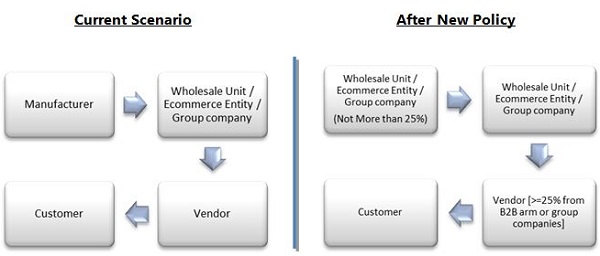Government has come up with new guidelines for e-commerce companies doing business in India. These guidelines seem to help in favor of Domestic Traditional Shopkeepers and may cause some difficulties to the e-commerce companies particularly which are receiving foreign investment into their entity. As an impact of the new guideline small shopkeeper, who were facing steep decline in their business, will get some breath of relief; however, on the other hand, for the e-commerce companies, particularly which are receiving investment from abroad, may hesitate a huge discount or cash-back offers.
Under the current scenario, e-com companies take benefit of their supply chain is formed in a way that they route the products either from their own entities or Business to Business (B2B) arms and as a result of that, they enjoy a sound control on inventory and pricing policy and offers various discount and cash back schemes.
Product Supply Chain

According to the new guideline of the government, vendors would not be able to purchase more than 25% of supply from their B2B arm, thus they will not be able to control the inventory as well as supply to the market. So they will loosen a grip on a huge discount policy and cash back offers as their acquisition cost may go high.
New draft has incorporated a word “Control” in addition to “Ownership” as “e-commerce marketplace entities can’t exercise ownership or control over the inventory. To define the control it is clarified that, a vendor’s inventory would be considered to be controlled if it makes more than 25% of its purchase from an e-commerce marketplace entity or group company. Under a current era the e-commerce platforms offer various facilities such as logistic service, cash back etc at different rates to different vendors. Now onwards, after the implementation of new policy, it is provided that cash-back offered to group companies of the e-commerce entity should be fair and non-discriminatory, so providing a service to any vendor in terms of cash-backs shall be applicable to all the vendors under equal circumstances.
There may be an adverse impact of his decision on e-commerce marketplace companies, as they would not be able to attract higher class of consumers via cash-back or huge discounted offers way, because they might not be able to maintain their low cost of acquisition as they would have been under the same group company or B2B arm. However, this will fill the gap between the price offered by such e-commerce marketplace and the traditional domestic shopkeepers. These e-commerce marketplace platforms have become a nightmare for such small shopkeepers and have hammered to earn their livelihood. Many of small shopkeepers has lost their major chunk of business to these platforms, and been forced to exit their traditionally well-established business. As the norms of new policy has put cap on purchase limit, such shopkeepers may have a ray of hope, breath of relaxation.
This change of policy may bring a loss to customers as well. E-commerce marketplace entities, in last one or two decades, has managed to attract a huge number of customers to the e-commerce market and has been able to become a major influencing player in demand supply cycle through their ability to offer huge discounted rates and cash-back offers. This were a benefit to customer but was also killing domestic market. This was also impacting domestic purchasing power of the Country, however under a new policy the domestic market will get a few boost to protect themselves against such bigger ecommerce marketplace entity or a group company .





